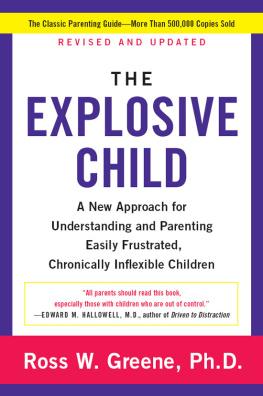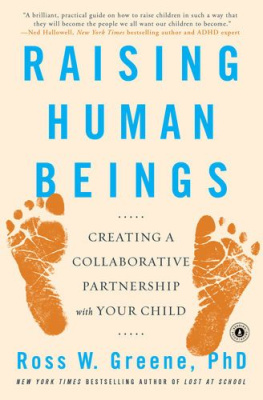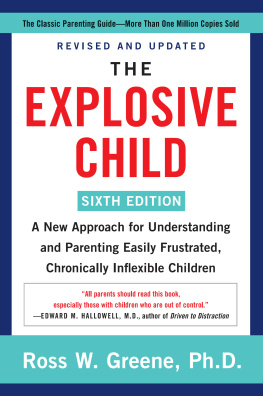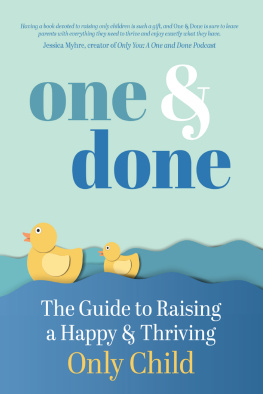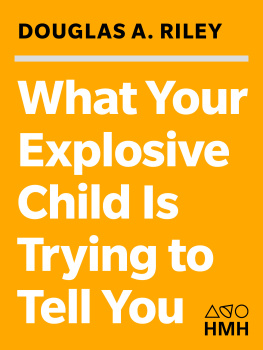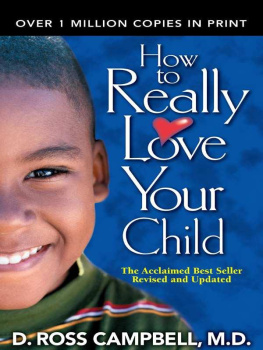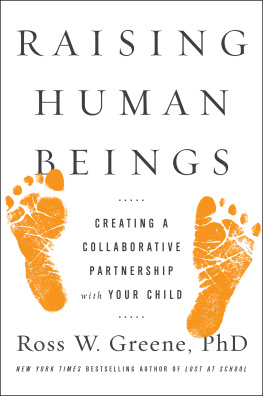Ross W. Greene - The Explosive Child
Here you can read online Ross W. Greene - The Explosive Child full text of the book (entire story) in english for free. Download pdf and epub, get meaning, cover and reviews about this ebook. year: 2014, publisher: HarperCollins Publisher, genre: Children. Description of the work, (preface) as well as reviews are available. Best literature library LitArk.com created for fans of good reading and offers a wide selection of genres:
Romance novel
Science fiction
Adventure
Detective
Science
History
Home and family
Prose
Art
Politics
Computer
Non-fiction
Religion
Business
Children
Humor
Choose a favorite category and find really read worthwhile books. Enjoy immersion in the world of imagination, feel the emotions of the characters or learn something new for yourself, make an fascinating discovery.
- Book:The Explosive Child
- Author:
- Publisher:HarperCollins Publisher
- Genre:
- Year:2014
- Rating:5 / 5
- Favourites:Add to favourites
- Your mark:
- 100
- 1
- 2
- 3
- 4
- 5
The Explosive Child: summary, description and annotation
We offer to read an annotation, description, summary or preface (depends on what the author of the book "The Explosive Child" wrote himself). If you haven't found the necessary information about the book — write in the comments, we will try to find it.
Ross W. Greene: author's other books
Who wrote The Explosive Child? Find out the surname, the name of the author of the book and a list of all author's works by series.
The Explosive Child — read online for free the complete book (whole text) full work
Below is the text of the book, divided by pages. System saving the place of the last page read, allows you to conveniently read the book "The Explosive Child" online for free, without having to search again every time where you left off. Put a bookmark, and you can go to the page where you finished reading at any time.
Font size:
Interval:
Bookmark:

In memory of Irving A. Greene
Anyone can become angry, that is easy...
but to be angry with the right person, to the right degree,
at the right time, for the right purpose, and in the right way... this is not easy.
ARISTOTLE
If I am not for myself, who is for me?
If I am only for myself, what am I?
If not now, when?
HILLEL
Illusions are the truths we live by until we know better.
NANCY GIBBS
CONTENTS
Welcome to the fifth edition of The Explosive Child , which comes about fifteen years after the first edition was published in 1998. What a fascinating fifteen years its been. The book has been published in dozens of languages. The model described in these pages has been implemented by countless families, schools, inpatient psychiatry units, and residential and juvenile detention facilities throughout the world. It has been validated as a research-based, scientifically proven intervention. And the model has continued to evolve as I receive feedback from those using it and try to delineate its principles and strategies in ways that are as clear and accessible as possible. This edition reflects the most current refinements.
Often people ask, How do I know if my child is explosive? Theres no blood test, of course. Explosive is just a descriptive term for kids who become frustrated far more easily and more often, and communicate their frustration in ways that are far more extreme than ordinary kids. To be perfectly honest, Ive never been a huge fan of the term. First, explosive implies that the outbursts of these kids are sudden and unpredictable andthis may be a little hard to believe at firstthats not true most of the time. Second, while many behaviorally challenging kids explode when theyre frustrated (screaming, swearing, hitting, kicking, biting, spitting, and so forth), many others implode instead (crying, sulking, pouting, having anxiety attacks, and being blue and withdrawn or cranky and irritable). So, the title of the book notwithstanding, the strategies described herein are applicable to kids who are exploding, imploding, or some combination of the two. The term Ill be using to refer to all of them is behaviorally challenging (also not an ideal term, but maybe the best we can do).
What youll learn in the early chapters of the book is that the terms that have commonly been used to characterize behaviorally challenging kidsterms such as willful, manipulative, attention-seeking, limit-testing, contrary, intransigent, unmotivatedare inaccurate and counterproductive. Youll also read that a lot of the things weve been saying about the parents of these kidsthat theyre passive, permissive, inconsistent, non-contingent, inept disciplinariansarent very accurate or productive either. In addition, youll learn (you may know this already) that the various psychiatric diagnoses that are commonly applied to behaviorally challenging kids dont provide us with the information we need to accurately understand their difficulties and effectively help them.
This may sound a little strange, but theres never been a better time to be living or working with a behaviorally challenging child. Thats because an enormous amount of research on behaviorally challenging kids has accumulated over the past forty to fifty years, so we know a lot more about why theyre challenging and how to help them than at any other point in human evolution. The research provides us with new lenses through which to view their difficulties, and those new lenses can help caregivers respond to and help these kids in ways that are more compassionate, productive, and effective. Thats the good news. The bad news is that the new lenses can take some getting used to (after all, you may have been wearing different lenses for a very long time) so seeing things through those alternate lenses will require an open mind. Also, the strategies contained in this book can be hard to implement (early on), may be different than the ones youve been using, and may represent a departure from the way you were parented. So youll need an open mind there, too, along with some patience (with yourself and your child) as youre practicing new ways of interacting and solving problems together.
If you are the parent of a behaviorally challenging child, this book should help you feel more optimistic about and confident in handling your childs difficulties and restore some sanity to your family. If you are the childs grandparent, teacher, neighbor, coach, or therapist, this book should, at the least, help you understand. There is no panacea. But there is certainly cause for hope.
ROSS W. GREENE, PH.D.
PORTLAND, MAINE
In prior editions of this book, I acknowledged my family last in this section. Im correcting that mistake now. My wife, Melissa, has been keeping life interesting and holding down the fort in our family for a very long time. My kids, Talia and Jacob, keep me laughing and learning and help me practice what I preach. Our dog, Sandy, continues to amaze us with her intuition and unconditional love. They allalong with my mother Cynthia, brother Greg, and sister Jillkeep me focused on the important stuff and have been remarkably supportive through some very difficult times. And the book is dedicated to my father, who died long before the first edition was published.
This book wouldnt have been published without the vision and commitment of my friend and agent, Wendy Lipkind, who died after a brief battle with cancer in 2011. While I still find myself wishing I could talk with her on many occasions, I have a decent sense of what Wendy would have said to me on various topics, so I still hear her sage wisdom whenever I remember to ask for it.
This book is a reflection of the remarkable insight, guidance, book-sense, and mastery of the English language of Samantha Martin. I may never write another book without her help.
My thinking about how to help challenging kids and their adult caretakers get along better has been influenced by many parents, teachers, and supervisors. It was my incredible good fortune to be mentored by Dr. Thomas Ollendick while I was a graduate student in the clinical psychology program at Virginia Tech. Tom has remained a very close friend since that time. Two mental health professionals who supervised me during my training years were particularly influential: Dr. George Clum at Virginia Tech and Dr. Mary Ann McCabe (then at Childrens National Medical Center in Washington, D.C.). Lorraine Lougee, a social worker when I was a psychology intern at CNMC, gets credit for pushing me to take a strong stand on behalf of kids who need help. I probably wouldnt have gone into psychology in the first place if I hadnt stumbled across the path of Dr. Elizabeth Altmaier when I was an undergraduate at the University of Florida (shes now at the University of Iowa).
However, those who were most central to the evolution of many of the ideas in this book, and to whom I owe a tremendous debt of gratitude, were the many kids, parents, educators, and staff with whom Ive had the privilege of working over the years. There are truly amazing people in this world who care deeply about improving the lives of kids, have embraced the approach described in this book and, with vision, energy, and relentless determination, have advocated for implementation of the approach in their schools, clinics, inpatient units, and residential and juvenile detention facilities. I have been privileged to cross paths with many of you.
Saturday morning. Jennifer, age eleven, wakes up, makes her bed, looks around her room to make sure everything is in its place, and heads into the kitchen to make herself breakfast. She peers into the freezer, removes the container of frozen waffles, and counts six waffles. Thinking to herself, Ill have three waffles this morning and three tomorrow morning, Jennifer toasts her three waffles and sits down to eat.
Font size:
Interval:
Bookmark:
Similar books «The Explosive Child»
Look at similar books to The Explosive Child. We have selected literature similar in name and meaning in the hope of providing readers with more options to find new, interesting, not yet read works.
Discussion, reviews of the book The Explosive Child and just readers' own opinions. Leave your comments, write what you think about the work, its meaning or the main characters. Specify what exactly you liked and what you didn't like, and why you think so.

